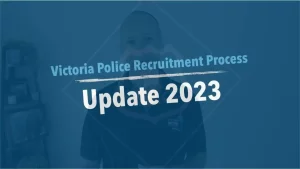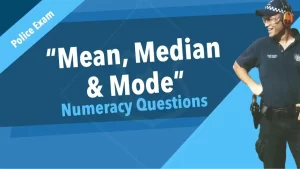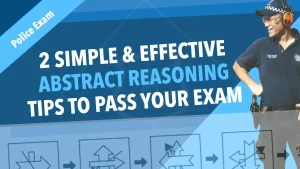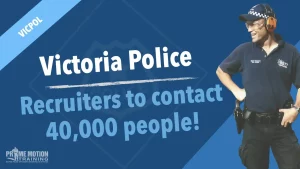It’s a condition of your employment as a police officer that you accept your chances of being transferred to any location within the state. So what happens if you don’t want to be transferred to a certain location?
Let’s discuss this issue in greater depth.
Summary
- It is a condition of employment that you agree to be transferred anywhere in the state of Victoria
- Transfers most likely occur at the end of your probationary period, 2 years after graduating
- Volunteers are sought for stations requiring more staff
- Names go in a hat where no volunteers come forward
- There is an appeals process for hardship cases
- Ultimately, you agree to be transferred anywhere when you join!
Transcription
In this article, I want to discuss with you the chances of being sent anywhere in the state of Victoria if you’re successful with your application to join the police force.
00:15 – Okay, obviously the first thing is that you need to accept certain conditions of employment if you do want to work for Victoria Police. One of those things, as a police officer, and certainly as a PSO, and even a Custody Officer is that your role will require you to work shift work. So, you might end up doing day shifts, afternoon shifts, night shifts. You’ll need to work weekends, public holidays, and this is par for the course. This is all part of working in this type of field.
00:42 – The other thing that I want to talk about in this article is the chances of you being sent to Horsham, Mildura, Swan Hill, or anywhere across the state. Now, of course, Victoria Police has to provide a statewide 24 hour, 365 days a year policing service. They need to be there to respond all year round, and right across the state.
01:05 – Now, someone has to man those particular areas, even remote areas. Some areas are so remote they have a one-man police station, and that particular member will actually live in the police station. All of these little pockets around the state need to be covered, and you need to be accept that you could be sent anywhere in the state as part of the process when you apply to join.
01:28 – In fact, at the end of the journey, when you do your selection panel interview, they’ll ask you to read out a document, and each line is an acknowledgment of those conditions of employment that I’ve just spoken about. You’ll need to initial each one of them, and at the bottom of the document, you’ll actually sign your life away, put your signature on that form.
01:47 – Now, once you’ve done your first two years of training, that’s the time where you’re most likely to be moved around to a new station, or to a new area. Generally what happens is that you’ll often get the chance to stay at your training station, but it does depend on the organization’s requirements.
02:16 – At the end of your probationary period, is when your location will be discussed, and what it means to you now as a new constable, continuing forward with your career. Part of that, what it means to you, is your work location. So generally what happens is if there’s a shortage of police officers in Mildura, what they’ll say is that your squad has been confirmed at a time where there just happens to be a need for a lot of police officers in Mildura.
02:46 – It does work in cycles. Sometimes people want to go to the country. “I want to go to Mildura, but I can’t get there because there are no positions available. The place is full of cops” and it could be quite the opposite 3, 4, 5, 10 years later, where nobody wants to go there and there are so many vacancies that they can’t get anyone to go there.
03:06 – In that sort of situation, we get into that territory where you may end up being sent there. So, let’s have a look at that timeframe. You’ve finished your two years, your probationary period’s over, and now your squad is going to be generally split up and moved around the state, and to different stations, based on the organization’s requirements.
03:27 – Let’s say there are some positions, let’s say there are five positions in Mildura that need to be filled. If you’ve got personal circumstances where maybe you’re married, you’re paying off a house, your kids are in school, your daughter might be starting university next year and is still living at home, and needs that support. Whatever the case might be, it could be difficult for you to be moved to Mildura or Horsham or somewhere else.
03:51 – What will happen is they’ll ask for volunteers. “We’ve got five positions available in Mildura. Hey, there’s a great local footy team, who wants to go to Mildura?” If we just hear crickets for a little while and no one volunteers, well then we have a little bit of an issue. If people volunteer and those positions are taken, great. Problem solved. If people are a little bit, “Oh yeah, maybe. I’m thinking about it,” then sometimes a little bit of a carrot is dangled where if you do take a position and you go to Mildura for a two year period, you might then get the opportunity to move back to Melbourne or back to an area where you’d like to be.
04:36 – They’ll give you that trade-off. “If you go to Mildura, we’ll let you choose the area that you want to go back to.” Not necessarily the specific station, and you certainly can’t say to them, “Well, when I’ve finished my two years at Mildura, I want to go to the SOG.” It doesn’t work like that, but you will get the opportunity to select the area that you’d like to move back to. And who knows? It’s happened before. People stay on, they meet someone, they get married, they get involved in the local community, they love the lifestyle, and they end up staying for the next 20 years.
05:05 – When I was confirmed, I went to Horsham for 12 months, really enjoyed the lifestyle there, completely different policing style to Prahran, where I came from, and a really nice place to bring up a family. In the end, I was still pretty junior and pretty keen to learn, and it was just too quiet for my liking, so I moved back to the city and continued on with the career.
05:27 – Okay, so back into the process. If people don’t volunteer and if they don’t take the carrot, then what happens is because the positions need to be filled, they do a ballot process. A ballot, I guess like any other ballot, is that you throw all the names in a hat, and you just simply say, “Righto, who’s going to Mildura? Lucky dip, one, two, three. Ah, Smith. Congratulations Smith. You’re going to Mildura.”
05:57 – That’s how it would work. Smith would be off to Mildura. Now, if that was to happen to you and by being moved to Mildura you would end up experiencing some type of hardship, there is an appeals process, but you would need to be able to show them some pretty genuine hardship, that that move to Mildura creates for you. If you just said, “Look, we’ve got a house we’re paying off, I can’t move,” that’s not a good enough reason to get out of being moved to Mildura.
06:29 – You’d have to have a pretty significant reason, and those reasons would be assessed on their merits, and on an individual basis. If you needed to be close to the Royal Children’s Hospital because you’ve got a severely disabled child or a very sick child, or for some reason, you needed to visit there regularly, it would create hardship moving you five hours up the road. So, in a situation like that, it would be very, very unlikely that you would lose that appeal and have to go anyway. You would probably, in all certainty really, you’d be able to stay. But there has to be some justified hardship that it creates by sending you to Mildura or anywhere else for that matter.
07:11 – All right. The other thing, of course, is that it’s unlikely that they’re going to force someone to go somewhere who doesn’t want to go there, because of what you might perceive as a hardship, whether they perceive it that way or not. Because they’ve invested time and effort and money and training into you. So, look, the last thing they want to do is force you to go and make you unhappy, but having said that, at the end of the day, the organization’s requirements and needs come first, and they come first because you agreed to those conditions during the application process.
07:43 – All right, so for some people, just to wrap it up now, for some people moving around the state is really attractive. It’s appealing. It is very, very good for your policing experience, if you can move around a little bit, experience different areas, different policing methods and so on. It’s really good for your long-term policing career, but for others, being moved to Horsham might be the worst thing that could have happened to you. But again, we come back to what I said at the start.
08:11 – It’s a condition of employment, and ultimately, your signature goes on that piece of paper. They could force you to move to that state, or offer you the alternative, which is to resign. Again, doesn’t happen very often, but you need to be very well aware of that if you do venture down this application process.
08:28 – All right, guys. I’m happy to discuss it. No doubt there are some questions that might come up from that. Please let me know if there are, and we’ll discuss it a little bit further. Other than that, just fingers crossed you get to go where you want to go because if you do, it just makes the career even more rewarding.
All right, guys. I’ll talk to you again soon.



